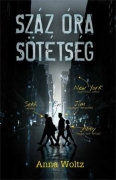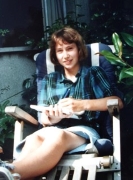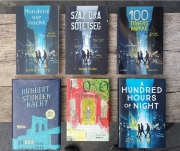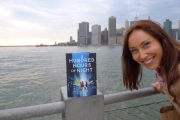The necessary triangle
A Hundred Hours of Night by Anna Woltz in Hungarian translation
Dutch children's and youth literature does rather well abroad. Classics, such as works by Annie M.G. Schmidt (1911-1995) and Guus Kuijer (1942) are often translated. Minoes is the most successful Dutch children's book abroad; Schmidt's “cat story” has been translated into thirty different languages. However, not only do classics do well beyond the borders of the Netherlands, but young Dutch writers are also well and increasingly represented on the world market of children's and youth literature. Such a representative is writer Anna Woltz (1981). She has written 26 books so far and her works have been translated into 24 different languages. Thanks to the active and committed work of the Pagony Publishing House, five of Woltz's books have already been translated into Hungarian by translator Andrea Rádai. Honderd uur nacht (Querido, 2014) (A Hundred Hours of Night) was the icebreaker, not only in Hungary, but also in Woltz's career. #Childrens' Literature
Decades of authorship in a nutshell
As a child, Woltz was not only an avid reader and frequent visitor of her local library, but her writing career also dates from that period of her life: she started writing when she was twelve. Her talent was obvious. At the age of 15, she wrote a year-long column for de Volkskrant about her experiences at secondary school. These stories were collected in 1998 under the title Overleven in 4B (Surviving 4B) and published by Nijgh & Van Ditmar. She made her debut in 2002 with her first children's book Alles kookt over [Everything boils over], published by Leopold publishers. A decade later, she moved to publishing house Querido within the Singel publishers. Shortly after, her career took a turn: in 2014 her book Mijn bijzonder raar week met Tess [My especially weird week with Tess] won the Vlag en Wimpel prize and a year later the same book was awarded by the Flemish Children and Youth Jury. Honderd uur nacht (A Hundred Hours of Night) was also nominated for the prestigious Woutertje Pieterse Prize and won the Nienke van Hichtum Award in 2015. #Prizes
Internationally renowned
Considering the translations of her work, the beginning of the 2010s can be seen as a milestone. The very first translations appeared in Slovenian (2012) and Danish (2013). Translations into Japanese and Hungarian followed in 2014. In translation sociology terms, these are all peripheral languages. Translations into central languages followed at a rapid pace in the following years, the first German translation appearing in 2015 and the English in 2016. Both national fame and recognition through the prestigious awards and international fame through translations into peripheral and central languages provided the breakthrough, with which Woltz’s name became known outside the Netherlands. The best example of this is her own authorial chapter in the publication The Book of Children’s Books, which was specially compiled for the Frankfurt Book Fair in 2016 when the Netherlands and Flanders were the guests of honour. This publication features a total of fifty Dutch and Flemish children’s book authors with one of their titles in the spotlight. Woltz’s name is on this list, with A Hundred Hours of Night receiving extra attention in the chapter.
The process of translating A Hundred Hours of Night into Hungarian
In the same period, the remarkable translation process of A Hundred Hours of Night into Hungarian took place. This translation is not only remarkable because of the history of the translation of Woltz’ work (the book being the fourth translation to her name). Also, because of the relatively short time in which after the publication of the original Dutch version, the Hungarian translation came into being: Querido published A Hundred Hour Night in April 2014 and in the same month sold the translation rights to Pagony, which then signed the contract with translator Andrea Rádai in June. Again a few months after that, in October, the Hungarian translation appeared. Given these dates, at first glance it might seem that Woltz was already an internationally known writer in 2014, but as it has been described in the previous paragraphs, at that very point the doors were opening for Woltz to become internationally acclaimed.
However, the speed of the Hungarian translation of A Hundred Hours of Night was due to several factors. First, it was due to the fact that this was Woltz's third title at Querido publishers. Also, the novel was included in Querido's spring 2014 brochure. Another factor was Woltz's ever-growing fame in the Netherlands, as A Hundred Hours of Night had been presented as book of the month in the well-known television programme De Wereld Draait Door in April 2014. Book seller and former literary panelist, Monique Burger spoke highly of Woltz and her work in the programme:
The time has come for Anna Woltz! She's only thirty-three but she's already written twenty books for young readers. Honderd uur nacht is a powerful book for young adults, about having courage and wanting to be independent. A book for teenagers and their parents to devour. She writes with a velvet pen - soft yet hard-hitting - about a brave young woman who takes charge of her life. It's as if the full stops at the end of the sentences aren't full stops, but little smiles. I was already impressed by Anna's earlier books, but A Hundred Hours of Night has turned me into an addict.
Funds: the necessary triangle

The fact that the contract between Querido and Pagony was signed in the month of the original Dutch publication is also partly due to the Bologna Children's Book Fair, which was also held in the same month. The two rights managers, Luciënne van der Leije (senior rights manager, Querido) and Hanna Győri (Pagony) met during the Bologna book fair and as a result of their conversation, the translation rights were sold to Pagony. It was not the first time that the two professional women had met each other; the mutual good experience is based on the fruitful working relationship between the two. This contact has already resulted in previous Hungarian translations of Dutch children's and youth works. However, there is a third, equally important player that reinforced this contact with its support, namely the Dutch Foundation for Literature, represented by Agnes Vogt, as genre specialist of children's and youth books. The translation of A Hundred Hours of Night into Hungarian was also subsidised by the Letterenfonds, the application by Pagony was submitted and approved in autumn 2014, as a result of which 70% of the translation costs were reimbursed by the Letterenfonds. As a result of all these factors, the Hungarian translation, under the title Száz óra sötétség was published on 31st October 2014, a short seven months later after its original publication.
In short, the main influences on this translation are to be sought in Woltz's reputation in the Netherlands and the triangle of Querido, Pagony and the Letterenfonds. #Mediators Woltz had three previous translations of other titles, so she was already present in the international book world. Through her nominations and awards for literary prizes, she became more and more visible, with the television programme De Wereld Draait Door also playing an important part. Woltz had two titles before A Hundred Hours of Night at Querido. Querido is doing very well in the market and it has to do with the reputation, quality and stability of the publishing house. Pagony is usually highly interested in Dutch children's and youth literature [link to Pagony], but in terms of timing, A Hundred Hours of Night fitted in perfectly with their new youth series called 'Tilos az Á könyvek'. Finally, the personal contacts in this story are also decisive; the contact between Querido and Pagony and between Pagony and the Dutch Foundation for Literature had been running smoothly even before the appearance of this title. All parties emphasised the pleasant cooperation and smooth communication between the partners.
(Krisztina Gracza)







